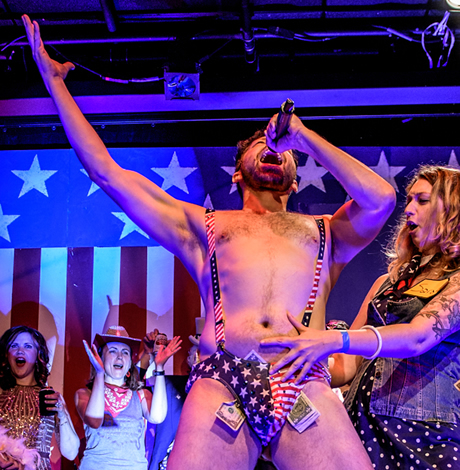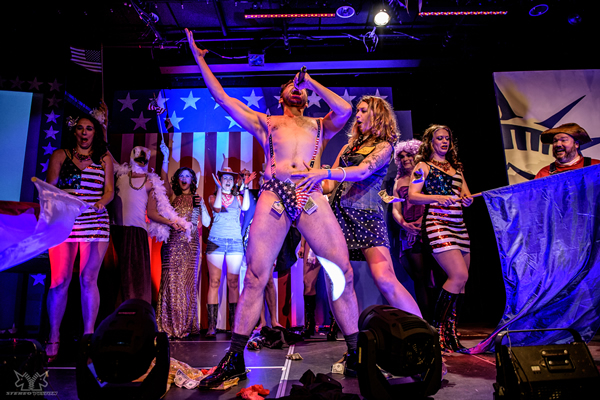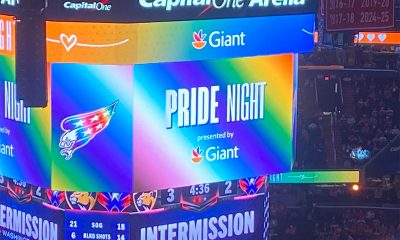Theater
Fringe Festival, cabaret series among summer theater offerings
‘The Color Purple’ returns to Kennedy Center; Synetic tackles ‘Oz’


Host Carlos Bustamante makes sure everybody wins in ‘America the Game Show.’ (Photo by StereoVision Photography)
Not going anywhere anytime soon? Why not make theater a part of your summer in the city?
Following its tradition of big summer musicals, The Kennedy Center presents “The Color Purple” July 30-Aug. 26. Adapted from Alice Walker’s Pulitzer Prize-winning novel, the national tour of the Tony Award-winning Broadway revival production recounts the sometimes heartbreaking but ultimately triumphant rise of an African-American woman in the American South. Details at kennedy-center.org.
Also, at the Kennedy Center, out actor Alan Cumming brings his inimitable blend of style, storytelling and activism with “Legal Immigrant,” July 28. Cumming promises a cabaret of songs and stories about his life and loves in his adopted homeland. The Gay Men’s Chorus of Washington joins him for the performance. Details at kennedy-center.org.
Summer Cabaret Series at Creative Cauldron (410 South Maple Avenue, Falls Church, Va.) features a lineup of terrific performers including the fabulous Jade Jones with “Killin’ Em Softly: A ’70s Soiree,” July 20-21; and out actor Stephen Gregory Smith traces his relationship with composer Matt Conner in “Inspired By” Sept. 7-8. Full details at creativecauldron.org.
At Signature Theatre (4200 Campbell Ave., Arlington, Va.), Sizzlin’ Summer Nights Cabaret Series rolls on with an impressive roster of singers including Erin Driscoll. With Ladies’ Night, July 26, the Helen Hayes Award-winning Driscoll celebrates the female songwriters of Broadway from Golden Age to contemporary songs, including women such as Dorothy Fields, Betty Comden, Jeanine Tesori. Full details at sigtheatre.org.
For a wild time, catch Astro Pop Events’ third annual “America The Game Show. F*ck Yeah!” July 21 at GALA Hispanic Theatre (3333 14th St., N.W.) and July 27-28 at Baltimore’s Creative Alliance (3134 Eastern Ave, Baltimore).
Inspired by TV’s “The Price Is Right” but with a subversive and sexy twist, the show is 90 minutes of outrageous games dealing with fracking, immigration and reproductive rights. A favorite game from last year’s show was called “Grab That Pussy!” which consisted of using tiny fake hands to toss stuffed kittens into holes cut from the folds of a drag queen’s voluminous skirt.
“‘Game Show’ has morphed over the years,” says director Kate Taylor Davis. “When we started it was the summer before the election. We assumed Hilary Clinton would be our next president. We were optimistic. The show was lot of goofy Americana with a political undercurrent. The second year that changed. It’s become more political, an expression of our frustrations. Our way of dealing with the madness is to poke fun and still try to find a way to love the country despite what’s happening now.”
Included in the shows cast are local performer Carlos Bustamante as cocksure emcee Carl who “embodies the quintessential American spirit by being supremely confident in his own self-worth and value.” The cast also includes out actors Chris Griffin (best known for his alt drag, oddly comical persona Lucrezia Blozia) as Liberty who stands seven feet tall in her glitter boots, and local actor Patrick M. Doneghy as Justice, a superhero who might have walked out of the D.C. Eagle. Both Justice and Liberty facilitate audience participation in the show’s games.
“We look forward to doing this every summer. I don’t know what we’d do for fun otherwise,” says Davis who helms the production with set designer Jared Davis. “It’s important for us to do a quirky, lowbrow, subversive thing. We think D.C. needs it.” Full details at astropopevents.com
Through July 29, Capital Fringe Festival 2018 offers a selection of Fringe theater, music, art, dance and unclassifiable forms of live performance. Many are of special interest to LGBT audiences — just a few of those are listed below. For a complete list of shows, times, and venues, go to capitalfringe.org.
There’s still time to catch Jamie Brickhouse’s comedy solo performance “Dangerous When Wet: Booze, Sex & My Mother,” July 21 and 24 at Saint Augustine’s Episcopal Church: Gold (555 Water St., S.W.) Capital Fringe’s website describes it best: “Sodomite Jamie Brickhouse’s alcoholic odyssey from small-town sissy to louche Manhattanite is wickedly intoxicating as he hits bottom and discovers he can’t escape the all-consuming love of his Texas tornado of a mother, Mama Jean. Darkly comic, you’ll cry laughing.”
Also, Three Muses (Arena Stage, 1101 Sixth St., S.W.) presents “God is Dead and April’s Getting Married,” July 21, 22, 28, 29. Penned by A.A. Brenner, the dramedy explores queerness, religion and friendship while asking if people ever truly change.
And Caitlin M. Capliner’s “Riot Brrrain,” July 21, 22, 24, 27, 28, at Blind Whino: Turquoise (700 Delaware Ave., S.W.) is an adults only musical comedy about neurosyphilis.
“Ghosts” from Muse Theatre Productions by Elford Alley is about a mysterious device that allows communication with the dead. It runs July 21-29 at Blind Whino: Yellow (700 Delaware Ave., S.W.). It’s the only horror/sci-fi show in this year’s festival and features LGBT personnel.
Fringe is fun but not always for kids. If children figure into your summer plans, there are options.
Synetic Theatre (now at Devine Theater located in the Davis Performing Arts Center on the Georgetown University campus) presents “The Wonderful Wizard of Oz” through Aug. 12. Of course, the innovative movement-based company puts a spin on the 20th century, L. Frank Baum favorite. Producing director Paata Tsikurishvili, director Ryan Sellers and choreographer Tori Bertocci create an environmental and spectacular adventure where verbal and nonverbal communication come together. Helen Hayes Award-winning out actor Philip Fletcher plays the Tin Man in search of a heart. Details at synetictheatre.org.
At Imagination Stage (4908 Auburn Ave, Bethesda) it’s “You’re a Good Man, Charlie Brown” through Aug. 12. Based on the comic strip “Peanuts” by Charles M. Schulz, the delightful Off-Broadway musical hit about childhood angst is staged by local acclaimed director Aaron Posner who’s usually found directing quality stuff for grownups. Details at imaginationstage.org.
And in Glen Echo Park, Md., Adventure Theatre MTC presents “Tinker Bell” through Aug. 19. Adapted by Patrick Flynn, it’s the Peter Pan story from the twinkly fairy’s point of view. Staged by out director Nick Olcott, the company’s summer fun show features a diverse cast led by Michelle Polera in the title role and Carlos Castillo as Peter Pan. Details at adventuretheatre-mtc.org.
Theater
Out actor Kevin Cahoon on starring role in ‘Chez Joey’
Arena production adapted from Broadway classic ‘Pal Joey’

‘Chez Joey’
Through March 15
Arena Stage
1101 Sixth St., S.W.
Tickets start at $93
Arenastage.org
As Melvin Snyder in the new musical “Chez Joey,” out actor Kevin Cahoon plays a showbiz society columnist who goes by the name Mrs. Knickerbocker. He functions as a sort of liaison between café society and Chicago’s Black jazz scene circa 1940s. It’s a fun part replete with varied insights, music, and dance.
“Chez Joey” is adapted from the Broadway classic “Pal Joey” by Richard Rodgers and Lorenz Hart. It’s inspired by John O’Hara’s stories based on the exploits of a small-time nightclub singer published in The New Yorker.
A warm and humorous man, Cahoon loves his work. At just six, he began his career as a rodeo clown in Houston. He won the Star Search teen division at 13 singing songs like “Some People” from “Gypsy.” He studied theater at New York University and soon after graduating set to work playing sidekicks and comedic roles.
Over the years, Cahoon has played numerous queer parts in stage productions including “Hedwig and the Angry Inch,” “La Cage aux Folles,” “Rocky Horror” as well as Peanut in “Shucked,” and George the keyboardist in “The Wedding Singer,” “a sort of unicorn of its time,” says Cahoon.
Co-directed by Tony Goldwyn and the great Savion Glover, “Chez Joey” is a terrific and fun show filled with loads of talent. Its relevant new book is by Richard Lagravenese.
On a recent Monday off from work, Cahoon shared some thoughts on past and current happenings.
WASHINGTON BLADE: Is there a through line from Kevin, the six-year-old rodeo clown, to who we see now at Arena Stage?
KEVIN CAHOON: Anytime I want to land a joke in a theater piece it goes back to that rodeo clown. It doesn’t matter if it’s Arena’s intimate Kreeger Theatre or the big rodeo at the huge Houston Astrodome.
I was in the middle stadium and there was an announcer — a scene partner really. And we were doing a back and forth in hopes of getting laughs. At that young age I was trying to understand what it takes to get laughs. It’s all about timing. Every line.
BLADE: Originally, your part in “Chez Joey” Melvin was Melba who sings “Zip,” a clever woman reporter’s song. It was sort of a star feature, where they could just pop in a star in the run of “Pal Joey.”
CAHOON: That’s right. And in former versions it was played by Martha Plimpton and before her Elaine Stritch. For “Chez Joey,” we switched gender and storyline.
We attempted to do “Zip” up until two days before we had an audience at Arena. Unexpectedly they cut “Zip” and replaced it with a fun number called “I Like to Recognize the Tune,” a song more connected to the story.
BLADE: Wow. You must be a quick study.
CAHOON: Well, we’re working with a great band.
BLADE: You’ve played a lot of queer parts. Any thoughts on queer representation?
CAHOON: Oh yes, definitely. And I’ve been very lucky that I’ve had the chance to portray these characters and introduce them to the rest of the world. I feel honored.
After originating Edna, the hyena on Broadway in “The Lion King,” I left that to do “Hedwig and the Angry Inch” as standby for John Cameron Mitchell, doing one show a week for him.
Everyone thought I was crazy to leave the biggest musical of our time with a personal contract and getting paid more money that I’d ever made to get $400 a week at the downtown Jane Street Theatre in a dicey neighborhood.
At the time, I really felt like I was with cool kids. I guess I was. And I never regretted it.
BLADE: When you play new parts, do you create new backstories for the role?
CAHOON: Every single time! For Melvin, I suggested a line about chorus boys on Lakeshore Drive.
BLADE: What’s up next for Kevin Cahoon?
CAHOON: I’m about to do the New York Theatre Workshop Gala; I’ve been doing it for nine years in a row. It’s a huge job. I’ll also be producing the “Cats: The Jellicle Ball” opening on Broadway this spring; it’s a queer-centric uptown vogue ball with gay actor André de Shields reprising his role as “Old Deuteronomy.”
BLADE: There’s a huge amount of talent onstage in “Chez Joey.”
CAHOON: There is. I’m sharing a dressing room with Myles Frost who plays Joey. He won accolades for playing Michael Jackson on Broadway. We’ve become great friends. He’s a miracle to watch on stage. And Awa [Sal Secka], a D.C. local, is great. Every night the audience falls head over heels for her. When this show goes to New York, Awa will, no doubt, be a giant star.
BLADE: Do you think “Chez Joey” might be Broadway bound?
CAHOON: I have a good feeling it is. I’ve done shows out of town that have high hopes and pedigree, but don’t necessarily make it. “Chez Joey” is a small production, it’s funny, and audiences seem to love it.
Theater
José Zayas brings ‘The House of Bernarda Alba’ to GALA Hispanic Theatre
Gay Spanish playwright Federico García Lorca wrote masterpiece before 1936 execution

‘The House of Bernarda Alba’
Through March 1
GALA Hispanic Theatre
3333 14th St., N.W.
$27-$52
Galatheatre.org
In Federico García Lorca’s “The House of Bernarda Alba,” now at GALA Hispanic Theatre in Columbia Heights, an impossibly oppressive domestic situation serves, in short, as an allegory for the repressive, patriarchal, and fascist atmosphere of 1930s Spain
The gay playwright completed his final and arguably best work in 1936, just months before he was executed by a right-wing firing squad. “Bernarda Alba” is set in the same year, sometime during a hot summer in rural Andalusia, the heart of “España profunda” (the deep Spain), where traditions are deeply rooted and mores seldom challenged.
At Bernarda’s house, the atmosphere, already stifling, is about to get worse.
On the day of her second husband’s funeral, Bernarda Alba (superbly played by Luz Nicolás), a sixtyish woman accustomed to calling the shots, gathers her five unmarried daughters (ages ranging from 20 to 39) and matter-of-factly explain what’s to happen next.
She says, “Through the eight years of mourning not a breeze shall enter this house. Consider the doors and windows as sealed with bricks. That’s how it was in my father’s house and my grandfather’s. Meanwhile, you can embroider your trousseaux.”
It’s not an altogether sunny plan. While Angustias (María del Mar Rodríguez), Bernarda’s daughter from her first marriage and heiress to a fortune, is betrothed to a much younger catch, Pepe el Romano, who never appears on stage, the remaining four stand little chance of finding suitable matches. Not only are they dowry-less, but no men, eligible or otherwise, are admitted into their mother’s house.
Lorca is a literary hero known for his mastery of both lyrical poetry and visceral drama; still, “Bernarda Alba’s” plotline might suit a telenovela. Despotic mother heads a house of adult daughters. Said daughters are churning with passions and jealousies. When sneaky Martirio (Giselle Gonzáles) steals the photo of Angustias’s fiancé all heck kicks off. Lots of infighting and high drama ensue. There’s even a batty grandmother (Alicia Kaplan) in the wings for bleak comic relief.
At GALA, the modern classic is lovingly staged by José Zayas. The New York-based out director has assembled a committed cast and creative team who’ve manifested an extraordinarily timely 90-minute production performed in Spanish with English subtitles easily ready seen on multiple screens.
In Lorca’s stage directions, he describes the set as an inner room in Bernarda’s house; it’s bright white with thick walls. At GALA, scenic designer Grisele Gonzáles continues the one-color theme with bright red walls and floor and closed doors. There are no props.
In the airless room, women sit on straight back chairs sewing. They think of men, still. Two are fixated on their oldest siter’s hunky betrothed. Only Magdelena (Anna Malavé), the one sister who truly mourns their dead father, has given up on marriage entirely.
The severity of the place is alleviated by men’s distant voices, Koki Lortkipanidze’s original music, movement (stir crazy sisters scratching walls), and even a precisely executed beatdown choreographed by Lorraine Ressegger-Slone.
In a short yet telling scene, Bernarda’s youngest daughter Adela (María Coral) proves she will serve as the rebellion to Bernarda’s dictatorship. Reluctant to mourn, Adela admires her reflection. She has traded her black togs for a seafoam green party dress. It’s a dreamily lit moment (compliments of lighting designer Hailey Laroe.)
But there’s no mistaking who’s in charge. Dressed in unflattering widow weeds, her face locked in a disapproving sneer, Bernarda rules with an iron fist; and despite ramrod posture, she uses a cane (though mostly as a weapon during one of her frequent rages.)
Bernarda’s countenance softens only when sharing a bit of gossip with Poncia, her longtime servant convincingly played by Evelyn Rosario Vega.
Nicolás has appeared in “Bernarda Alba” before, first as daughter Martirio in Madrid, and recently as the mother in an English language production at Carnegie Melon University in Pittsburgh. And now in D.C. where her Bernarda is dictatorial, prone to violence, and scarily pro-patriarchy.
Words and phrases echo throughout Lorca’s play, all likely to signal a tightening oppression: “mourning,” “my house,” “honor,” and finally “silence.”
As a queer artist sympathetic to left wing causes, Lorca knew of what he wrote. He understood the provinces, the dangers of tyranny, and the dimming of democracy. Early in Spain’s Civil War, Lorca was dragged to the the woods and murdered by Franco’s thugs. Presumably buried in a mass grave, his remains have never been found.
Theater
Magic is happening for Round House’s out stage manager
Carrie Edick talks long hours, intricacies of ‘Nothing Up My Sleeve’

‘Nothing Up My Sleeve’
Through March 15
Round House Theatre
4545 East-West Highway
Bethesda, Md. 20814
Tickets start at $50
Roundhousetheatre.org
Magic is happening for out stage manager Carrie Edick.
Working on Round House Theatre’s production of “Nothing Up My Sleeve,” Edick quickly learned the ways of magicians, their tricks, and all about the code of honor among those who are privy to their secrets.
The trick-filled, one-man show starring master illusionist Dendy and staged by celebrated director Aaron Posner, is part exciting magic act and part deeply personal journey. The new work promises “captivating storytelling, audience interaction, jaw-dropping tricks, and mind-bending surprises.”
Early in rehearsals, there was talk of signing a non-disclosure agreement (NDA) for production assistants. It didn’t happen, and it wasn’t necessary, explains Edick, 26. “By not having an NDA, Dendy shows a lot of trust in us, and that makes me want to keep the secrets even more.
“Magic is Dendy’s livelihood. He’s sharing a lot and trusting a lot; in return we do the best we can to support him and a large part of that includes keeping his secrets.”
As a production assistant (think assistant stage manager), Edick strives to make things move as smoothly as possible. While she acknowledges perfection is impossible and theater is about storytelling, her pursuit of exactness involves countless checklists and triple checks, again and again. Six day weeks and long hours are common. Stage managers are the first to arrive and last to leave.
This season has been a lot about learning, adds Edick. With “The Inheritance” at Round House (a 22-week long contract), she learned how to do a show in rep which meant changing from Part One to Part Two very quickly; “In Clay” at Signature Theatre introduced her to pottery; and now with “Nothing Up My Sleeve,” she’s undergoing a crash course in magic.
She compares her career to a never-ending education: “Stage managers possess a broad skillset and that makes us that much more malleable and ready to attack the next project. With some productions it hurts my heart a little bit to let it go, but usually I’m ready for something new.”
For Edick, theater is community. (Growing up in Maryland, she was a shy kid whose parents signed her up for theater classes.) Now that community is the DMV theater scene and she considers Round House her artistic home. It’s where she works in different capacities, and it’s the venue in which she and actor/playwright Olivia Luzquinos chose to be married in 2024.
Edick came out in middle school around the time of her bat mitzvah. It’s also around the same time she began stage managing. Throughout high school she was the resident stage manager for student productions, and also successfully participated in county and statewide stage management competitions which led to a scholarship at the University of Maryland, Baltimore County (UMBC) where she focused on technical theater studies.
Edick has always been clear about what she wants. At an early age she mapped out a theater trajectory. Her first professional gig was “Tuesdays with Morrie” at Theatre J in 2021. She’s worked consistently ever since.
Stage managing pays the bills but her resume also includes directing and intimacy choreography (a creative and technical process for creating physical and emotional intimacy on stage). She names Pulitzer Prize winning lesbian playwright Paula Vogel among her favorite artists, and places intimacy choreographing Vogel’s “How I learned to Drive” high on the artistic bucket list.
“To me that play is heightened art that has to do with a lot of triggering content that can be made very beautiful while being built to make you feel uncomfortable; it’s what I love about theater.”
For now, “Nothing Up My Sleeve” keeps Edick more than busy: “For one magic trick, we have to set up 100 needles.”
Ultimately, she says “For stage managers, the show should stay the same each night. What changes are audiences and the energy they bring.”




















